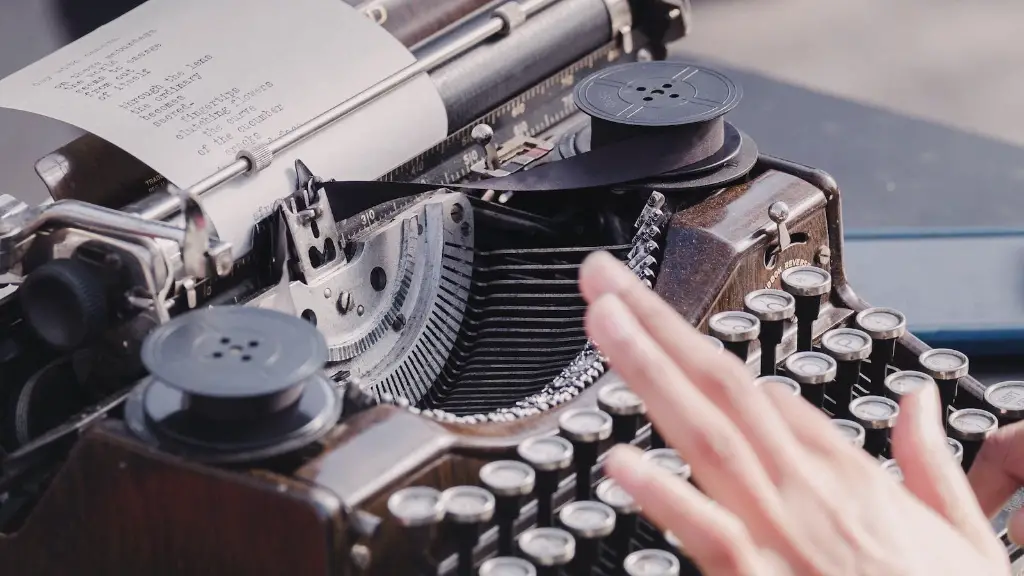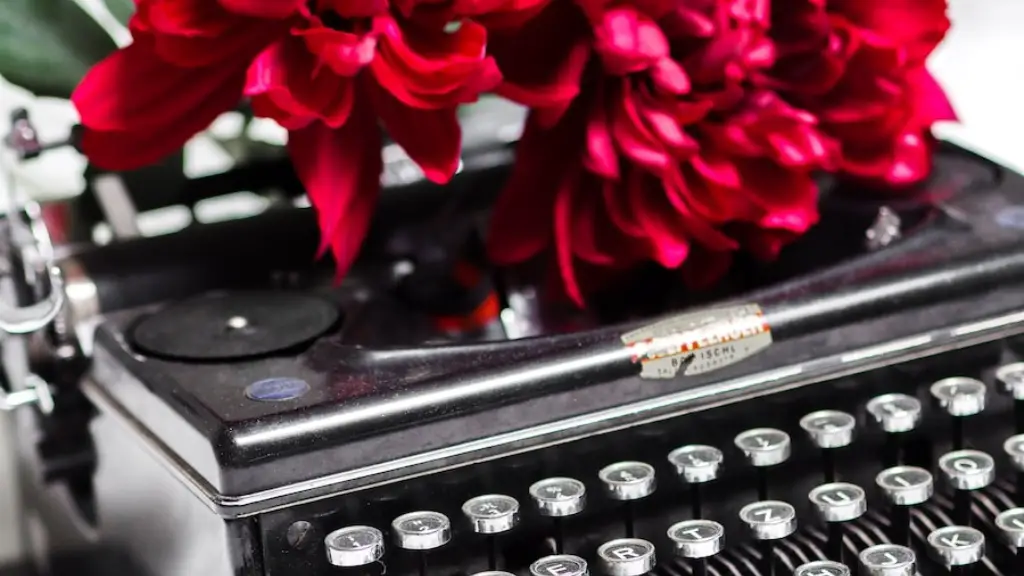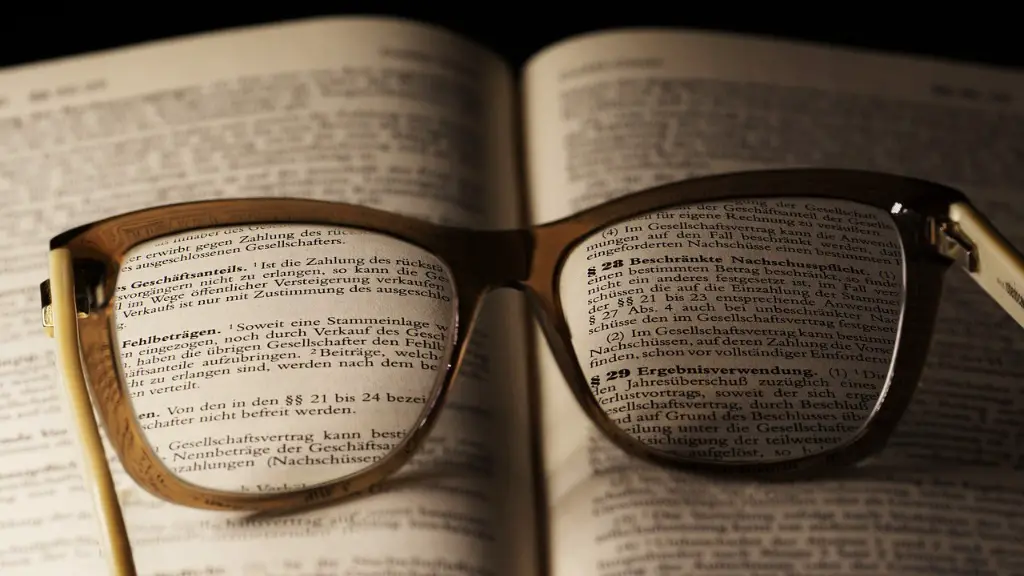Throughout its illustrious history, poetry has always been an important part of art and literature, and it is often argued that it has been among the most influential forms of creative expression in the world. While opinions differ on what exactly constitutes ‘art’ and whether or not poetry can genuinely be considered as such, it is undeniable that poetry has the ability to move people, to inspire thought and emotion, and to stimulate debate.
The term ‘art’ itself is highly subjective. To some, it is seen as something that is beautiful, aesthetically pleasing and somehow relevant to a particular person or culture. To others, it is something which evokes a response, can be appreciated in its own right, and has the potential to challenge accepted norms and beliefs. When it comes to poetry, the distinction is even more difficult to make.
On one hand, the traditional definitions of art may not be sufficient to encompass the full extent of what poetry has to offer. Poetry, after all, is not simply about the words that are used, but about the imagery, the rhythm and the structure of the poem itself. It is also about the feelings that it creates in the reader, about the way that it enables us to express our thoughts in a way that cannot be achieved through any other medium.
On the other hand, poetry can also be seen as something which is more akin to a craft than an art. It still takes skill and practice to create, but it is often seen as something which is more focused on conveying an emotion, a feeling or a certain idea, rather than something which is intended primarily to be aesthetically pleasing. Furthermore, there are times when a poem may contain some elements which can be considered art, but is also not necessarily an artistic endeavour in its own right.
Ultimately, the answer to the question of whether or not poetry is considered art is highly subjective, as art itself is a highly personal and individual experience. There is no doubt however that poetry is capable of inspiring emotion and communicating ideas in a truly powerful way, and that it is something which can be appreciated and enjoyed regardless of whether or not it is considered to be art.
Role of Poetry in Art
From a historical perspective, poetry has always been an important part of the art world. Throughout the centuries many great works of literature have been hailed as true works of art, with poems often being seen as integral to the overall work. For example, the Roman poet Vergil’s epic poem “The Aeneid” was widely recognised in ancient times as a true work of art, and often mentioned in the same breath as works of art created in later centuries.
In more recent times, poetry has often been used to explore the idea of art itself. Poets such as T.S Eliot, W. B. Yeats, and Czeslaw Milosz have all used their poetry to explore their own views on what truly constitutes ‘art’ and how it should be defined. This has enabled them to both educate and engage their readers in a unique and often profound way.
Furthermore, the power of poetry to evoke emotion and to challenge accepted ideas has allowed it to become an increasingly important part of the art world, with many poets also engaging in visual arts such as painting and sculpture in order to communicate their ideas. In this respect, poetry can be seen as an intrinsic part of the art world, one that can help to inspire thoughts and emotions, and to create a space in which new ideas can be explored.
How Poetry Shapes Our World
Ultimately, poetry has the ability to shape how we think, how we perceive the world around us, and to alter our perspectives and attitudes towards things. It is a creative form of expression which can inspire feelings of hope, of grief, of joy and of fear, and can even help to empower people to stand up for what is right and to make a positive difference in their own lives.
By providing an outlet for expressing our thoughts and feelings, poetry can help to bring people together, to build a sense of community and connection, and to spread messages of understanding and respect. For example, many great poems such as Dylan Thomas’s “Do Not Go Gentle into That Good Night” and Walt Whitman’s “O Me! OLife!” have been seen as powerful reminders of the importance of living life to the fullest and of appreciating the beauty of the world around us.
In many ways, poetry has the potential to alter our outlook and the way in which we approach things, and to be a source of comfort in times of hardship. Whether or not it is considered ‘art’ in itself is up for debate, but there is no denying that it can be a truly powerful and influential force in our lives, and one that can help to shape our understanding of the world around us.
Exploring Poetry
Despite the fact that poetry can be a difficult thing to define and to categorise, it is undeniable that it is an important part of our culture and our history. By exploring different forms of poetry, from traditional styles such as sonnets and haikus to modern forms such as spoken word and rap, we can gain a better understanding of the power and potential of this creative form of expression.
Furthermore, there is much to be learned from the various interpretations and perspectives offered by poets, and by engaging with their words we can gain a deeper appreciation of their meanings and of the implications of their work. It is this kind of exploration which helps to make poetry a truly unique and powerful form of art, and one which is capable of inspiring emotion and thought in its readers.
By making an effort to actively explore and engage with poetry, we can learn a great deal about not only the power of this art form, but also of the ways in which it can shape and influence our lives. By opening ourselves up to the power of poetry, we can gain an invaluable insight into ourselves, our culture, and the world around us.
Tools for Understanding Poetry
Although exploring poetry can be an intimidating task, there is no need to feel overwhelmed. There are numerous tools available, such as online courses and poetry appreciation classes, which can help to make the process of understanding, interpreting, and appreciating poetry a much easier and less intimidating task.
Furthermore, by attending poetry readings and workshops, or simply by talking to those who have a keen interest in the art form, one can gain a better understanding of the various elements which make up a poem, and a better appreciation of the power and potential of poetry.
Ultimately, there can be no denying that poetry is an important and influential art form which has the potential to both move and challenge us. By exploring it, and by understanding the tools which can be used to analyse and appreciate it, we can gain a better appreciation of both the power and potential of this unique medium.
Getting Creative with Poetry
Once one has gained a basic understanding of the principles of poetry, it can often be a rewarding and inspiring experience to try one’s hand at creating a poem. There are various techniques which can be used to get started, such as keeping a notebook of ideas, or trying a poetic form such as a sonnet or villanelle.
By experimenting with different poetic forms and styles, one can hopefully find something which resonates and speaks to one’s own experiences and emotions. There is something incredibly liberating and powerful about being able to express oneself in this way, and by embracing the power of poetry we can gain a truly unique insight into ourselves and the world around us.
Furthermore, many poets find that once they have become comfortable with creating their own poetry, the opportunities for expression become much greater. By combining traditional poetic forms with modern sensibilities, and by drawing from different sources such as music and other forms of art, one can create exciting, unique and highly personal works which can be shared and appreciated by others.
Demand for Poetry
In recent years, there has been an increasing demand for poetry in both the literary and art world. From the resurgence of slam poetry to the increased appreciation of spoken word artists, the popularity of poetry has been on the rise, and this is reflected in the numbers of festivals and competitions dedicated to the art form.
By attending these festivals and events, or simply by searching online, one can gain an appreciation of the various forms that poetry can take, and come to understand the various influences and ideas which help to shape it. Furthermore, by reading the works of prominent poets one can gain a sense of the various trends and topics which are being explored by those in the poetry community, and can thus gain a greater appreciation of the potential of this creative form of expression.
In conclusion, whether or not it can be considered art, there is no denying that poetry has the potential to profoundly influence the way we perceive and interact with the world around us. By gaining an understanding of the various tools and techniques associated with the art form, it is possible to not only appreciate the impact which poetry can have, but to also gain a unique insight into ourselves and the world around us.
Staying Relevant with Poetry
In order to remain relevant in a constantly changing world, poets need to constantly push themselves in new and exciting directions. By experimenting with different forms, themes and styles of poetry, poets can ensure that their work is both current and engaging, and that it is able to appeal to a wide range of readers.
By drawing upon various influences and sources of inspiration, poets can ensure that their work stands out from the crowd and has the potential to capture the imagination of others. Furthermore, by continuing to develop and expand upon existing ideas and concepts, poets can ensure that their work is truly unique and innovative, and is thus able to maintain its relevance.
In more recent years, technology has allowed poets to reach even wider audiences, and to explore ideas which have previously been considered difficult or impossible to express in written form. With the increased number of online platforms, magazines, and anthologies dedicated to the art form, it is possible for poets to share their work with an even greater audience, and thereby to ensure that their words reach more people and have a greater impact.
Adapting to Changes
It is essential for those who choose to explore and create poetry to stay abreast of changes in society and culture, as this can affect the way in which people perceive their work. By staying open to new perspectives and adapting to social, economic and political realities, poets can ensure that their work is both relevant and timely.
Furthermore, as technology continues to evolve, it is important for poets to stay up to date with the various developments. By using new technologies to their advantage and by exploiting the various opportunities which they can provide, poets can make sure that their work stands out from the crowd and that it resonates with modern readers.
By staying engaged with the world around them and by adapting to the ever-changing nature of poetry and its evolution, poets can ensure that their words reach the widest possible audience, and that their work is able to have a meaningful and lasting impact.





